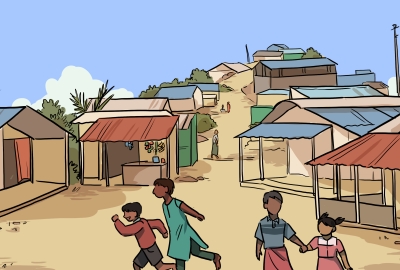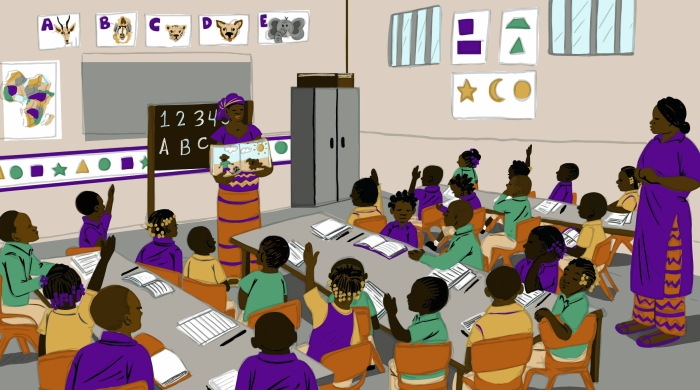
Written by Sneha Bolisetty, Yeshim Iqbal, AK Rahim, Shikhty Sunny, Fatima Zahra
Global TIES for Children is excited to share some initial results from preliminary research concerning fathers’ involvement in children’s development in Rohingya refugee communities in Cox’s Bazar, Bangladesh. The research was conducted as part of the LEGO foundation-funded Play to Learn project, a partnership between Sesame Workshop, BRAC, the International Rescue Committee (IRC), and TIES to provide and understand a range of early child development services for these communities. NYU’s research unearths important new insights on Rohingya fathers’ perceptions of play, child development, and child safety.
With nearly 11 million children classified as refugees globally, finding ways to improve early child development services and support in these contexts is an increasing area of focus for the global humanitarian community. The Play to Learn project, which launched in 2018, seeks to provide and understand the impact of ECD services in the Rohingya camps in Cox’s Bazar, Bangladesh, with a focus on play and playful learning. Cox’s Bazar is currently home to more than a million Rohingya, one of the most persecuted minorities in the world, who have been escaping Myanmar in response to persecution over multiple decades. The largest influx entered Bangladesh in 2017 in response to a military crackdown in Myanmar. These 20 camps in Cox’s Bazar, host as many as 450,000 children, many of whom have been born there.
NYU Global TIES for Children has been working with on-the-ground data collection partners, including Innovations for Poverty Action (IPA), to collect data in the camps and better understand the reception, perception, and impact of the Play to Learn programs. Among the interventions being developed for the project are several services designed to directly support caregivers. Conventionally targeting mothers, PtL project partners are trying to adapt some of their services to also include fathers. Though this may seem straightforward, there is actually very little existing literature on the effect of fathers’ involvement in the context of forced displacement. The majority of research on fathers' involvement, and its effect on children’s development, has taken place in Western settings. Given this gap, NYU researchers wanted to better understand how Rohingya fathers currently perceive and engage in child development in this context.
The current body of literature demonstrates that fathers’ involvement is quite important for child development, and that fathers contribute to children’s emotional health, overall wellness, social development and self-respect. It also suggests that fathers’ presence and engagement may impact cognitive development, with findings showing that fathers’ interaction has been positively associated with a preschoolers’ early literacy and numeracy skills. This research, however, takes a primarily western-centric focus and doesn’t address unique challenges for fathers’ involvement in refugee contexts.
To help researchers better understand how caregivers perceive the characteristics of children and their perceptions of parenting and play, NYU-trained enumerators interviewed Rohingya fathers to learn more. Findings from 25 interviews with fathers have a range of applications for practitioners and caregivers, and contribute to the body of available research on fathers’ roles in child development.
Importantly, these findings confirm that fathers acknowledge ‘play’ as an important daily activity for their children, with regards to both structured or unstructured play. However, in comparison to mothers, Rohingya fathers are less involved with their children in terms of play. While mothers are more concerned with child daily hygiene and health, fathers are more concerned with safety and security of children, with one Rohingya father stating “They [children] play on the roads; any accidents can happen anytime.” Additionally, while parents can be lenient when it comes to younger children playing with other children in mixed gender groups, fathers did mention that for certain games that are considered “gendered”, boys and girls playing together is looked down upon. “Girls should not jump around. Boys should run around and play sports,” one Rohingya father said.
Findings from fathers' interviews also gave researchers insight into the range of play that children engage in. In interviews, fathers stated that children love to play games that require physical movement, such as running with friends, jumping, and clapping. They also love anything they can imagine as toys, which extend across a wide range of items that can be found in the camps. In addition to balls, toy cars, and plastic bottles, there are also ‘kitchenware toys’ that include coconut shells, twigs, sticks, and plastic, which can be made at home or purchased. Some games that children also play include ‘going to the bazar’, where fake money is made out of leaves, and ‘building house’ which is played during monsoon season, which display the range of toys and games played by children in the Rohingya camps.
TIES will soon be releasing a research brief related to these preliminary findings. Follow them on Twitter and check their website to stay up to date on the release of this and more Play to Learn briefs!
Learn More
Global TIES for Children
Global TIES for Children is an international research center at New York University dedicated to designing, evaluating and advising on programs and policies to improve the lives of children and youth in the most vulnerable regions across the globe.


